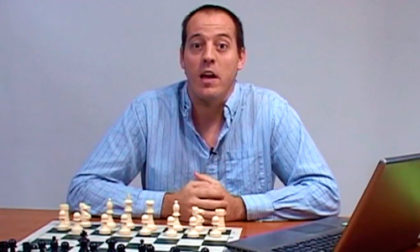Bizarre Online-Poker Tax Battle Sinks Spanish Chess Grandmaster Francisco Vallejo Pons
Here’s a story we’ve been saving for April Fool’s Day, because even though it’s a real tale, it’s so bizarre and unbelievable on its face that it ought to be one of those farcical parodies other sites are offering today. To wit: This week a couple of Spanish news outlets broke the story of Francisco Vallejo Pons, the country’s youngest-ever chess grandmaster, who has been put close to financial and competitive ruin due to the misconstruction of Spanish laws regarding gambling winnings.
Vallejo Pons traveled frequently, playing chess around the globe, and around the start of 2011 he began dabbling in online poker. That’s a very natural thing; when one travels as a way of life, there’s a tendency to find a pastime that one can curl up with in quiet time, away from the distractions and people of outside life.

This photo was taken by Przemysław Jahr Wikimedia Commons – Own work, CC BY-SA 3.0, https://commons.wikimedia.org/w/index.php?curid=29703211
Vallejo Pons apparently had enough in the way of income or savings to be able to fund one or more online poker accounts, at least modestly, and he likely played at mid-level stakes. Overall, according to an interview with Spain’s El Mundo, he lost everything he deposited — meaning a few thousand euros.
So he was surprised when he was contacted by Spanish tax authorities in 2016 regarding his online-poker play, and even more stunned when he was hit with a tax bill for roughly half a million euros, or the equivalent of US $612,000. See, Vallejo Pons lost more than he won, and seemingly never even cashed out from the site or sites where he played.
As Vallejo Pons told El Mundo:
My manager told me something by email in April 2016, and the first thing I said was that they had to have made a mistake with the figure they had given us. I had never given any importance because I was sure I had never won or lost a very large number. In fact, it turns out that I have had losses: never, not once, I made a withdrawal from a bookmaker to my bank account, because simply, in the global I lost money. When I was really aware of the seriousness of the problem, it was towards October of that year, when I visited Menorca and met in person with my manager.
The problem was an antiquated but still applicable Spanish gambling law stating that gambling winnings are taxable — at a hefty 47% rate — but losses aren’t deductible as write-offs against the wins. Spain’s law on such matters was changed in 2012, but the tax authorities applied the old law against Vallejo Pons and his online play, as a tiny part of that country’s crackdown and eventual firewalling of all Spain-facing online gambling services.
It’s unclear how many Spanish online poker players were targeted, though few likely would have been hit with a tax bill the size of what faced Vallejo Pons. It’s also unclear exactly how the Spanish tax authorities determined the full extent of Vallejo Pons’ online play; online results databases aren’t as trustworthy or as accurate as those pertaining to live-tourney play.
Nonetheless, Spain’s tax folks obtained some information, and on that basis, plus refusing to acknowledge Vallejo Pons’ losses, they’ve since seized most of his life savings. The stress forced Vallejo Pons — once ranked as high as #18 globally in chess — to withdraw from a more recent major chess event in Georgia, and have cause him other health problems.
It’s an awful tale, bordering on farce in the details. Yet in Vallejo Pons’ misfortune, there are many things the poker world can learn.
First, governments around the globe have been tracking online results databases for years, with a particular eye on high-spending poker players whose results are out there… somewhere. Usually (but not always) it’s the big-score tourney player who gets noticed. There was this tale from Israel just a few months ago; Sweden has undertaken similar efforts for at least a decade, as have many other countries.
That failure to allow for gambling losses has also been a bane to poker players and companies over the years. In the US, such an antiquated law in Illinois served as the basis for a couple of comedic third-party lawsuits brought against the old Full Tilt Poker, and a similar statute is the basis for the ridiculous $870 million judgment the state of Kentucky essentially awarded itself in its still-active case against PokerStars,
These awful, antiquated laws are still out there, all over the globe. Examined objectively, all these jurisdictions have been years, if not decades, behind grasping the nature of online gambling in general and poker in particular. Why, it’s as if opponents of gambling crafted those laws….
Still, the poker world could help itself, too. One thing that would be beneficial is a realignment of the way poker results are recorded. Most major results sites only record cashes, rather than all entries paid. Doing the latter would involve, well, seven to ten times more data, but it would provide much more accurate profit-loss numbers, plus some legitimate measures of “skill” as opposed to just counts of dollars won. (Note that I’m not really expecting this to happen, for many reasons.)
That still wouldn’t have helped Francisco Vallejo Pons. His sad tale is perhaps best looked at as an example of what happens when a global gambling industry clashes against a nation’s out-of-touch laws. It’s happened before, and it will happen again.




















COMMENTS